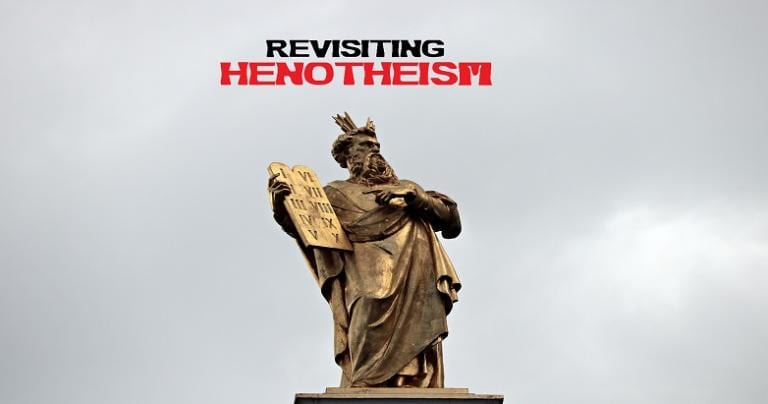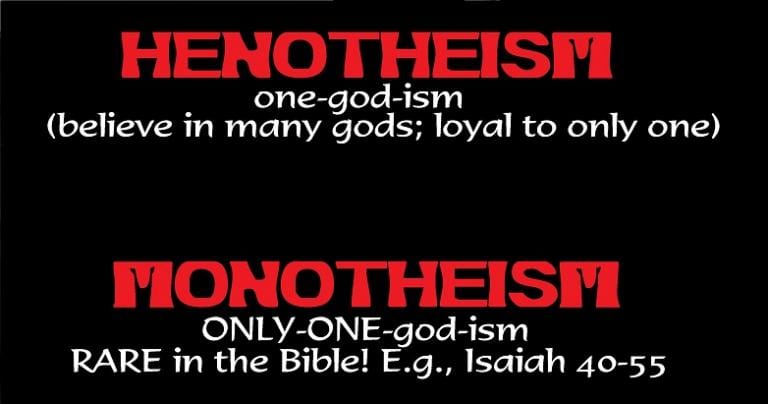
Revisiting the controversial subject of henotheism is good for spuriously familiar readings of Old Testament Scriptures we think we know so well.
Revisiting henotheism in the Bible in this post, folks. This is a subject that causes quite a stir, as in stir up a hornet’s nest. Earlier we covered the subject well enough here and here, but I felt the need to revisit things over the weekend. So here goes.
I just want to say right off the bat that I am Catholic, and therefore, I am a Trinitarian monotheist. I accept the Mystery of One God in three Persons. What I am ardently against is the supersessionistic connect-the-dots mishandling of Scripture quotes used to “prove” Catholicism.
Neither Jews Nor Christians…
If we are going to get controversial, let’s not hold back. First off, a shocker—there are neither Jews nor Christians anywhere in the Old or New Testaments, except in mistaken translations. As the Context Group scholar John Elliott argued in his tour de force—
“The concepts ‘Jew’,‘Jewish’ and ‘Christian’ as understood today are shaped more by fourth century rather than first-century CE realities and hence should be avoided as anachronistic designations for first-century persons or groups.”
You can read Elliott’s scholarly paper here:
Jesus the Israelite Was Neither a `Jew’ Nor a `Christian’: On Correcting Misleading Nomenclature
Revisiting Anachronistic Absurdities
It would be absurd to imagine Abraham or Moses as early “Jews” or Christians for that matter. Likewise, neither were monotheists. Revisiting these figures in new ways, we can still call Abraham the father of the three great monotheistic traditions (even though he wasn’t a monotheist) just as we can call Paul the Apostle to the Gentiles (even though he didn’t go to them). Neither Abraham nor Paul intend to be how we remember them, but strange things happen, and things evolve. As they say, when Buddha dies, the schools open. To that I add, God works in the messiness, and with good humor.

As we said before, monotheism is rare in the Bible. And that statement is really irrefutable. Israelites were henotheistic, not monotheistic. As such, Israelites believed that there are many gods at work in the Cosmos. But only with one of these does Israel covenant.
Revisiting the Henotheistic Israelite Scriptures
Look at how henotheistic the Israelite Scriptures are. Everywhere the God of Israel wages war on other peoples and their gods, achieving honor as would any earthbound king when he defeats another king in battle. How often we read of the God of Israel’s mighty and outstretched arm (Deuteronomy 4:34; 5:15; 2 Kings 17:36; Psalm 44:3; 89:10, 13)! Many times we read of this God’s “right hand” leading Israel to freedom and victory (Exodus 3:20; 15:6, 9, 12; Psalm 89:13; 118:15-16).
Consider that, if these passages were written by monotheists, they would be extremely different! If there is only one God in existence, with whom can God compete in order to gain honor by defeating? If there are no other gods, God has no one to battle, and therefore cannot be a warrior (Exodus 15:3)! In monotheism, God quickly is recognized as immutable, so how can he gain honor?
YHWH is El
Yahweh, the god of David and Israel under David, is the name given to the most high god of the Canaanite pantheon, El. At some point in the story of Israel, El was merged with Yahweh. Originally Israelites conceived Yahweh as a storm god (Judges 5:5, 21; 1 Samuel 12:18; 1 Kings 8:35), a war god (Exodus 15:3; Psalm 24:8), and a god of one people among many such gods for other agrarian, warrior peoples (Judges 11:24).
Revisiting things, it’s a good time to again repeat a very important rule about theology. All God-talk is analogy. And all analogy is rooted in human experience. And since all human experience is culturally specific, everything said of in the Bible about God is anthropomorphic analogy to Middle Eastern and Mediterranean cultural life. Consequently, without a fitting analogue to develop a monotheistic picture of God, Israelites simply couldn’t be monotheists. We learned about that here.
Keep in mind that all these ancient people were collectivistic, dyadic personalities. They could not imagine their god without being accompanied by a fancy entourage and host of other, lesser gods.
When the Hebrew Scriptures were translated into Greek, Yahweh was rendered as Kyrios, or Lord. Revisiting this subject, please recall that Lord means a male whose authority over persons, beasts, and all other objects in a given region is absolute. But in the following verses we have kept the name of the God of Israel, Yahweh, as it appears in earliest Hebrew texts we have.
Genesis 13:4
… Abram called on the name of Yahweh.
Right. He did not call on the name of Chemosh or Baal or Molech. He called on the name of the Patron God of Israel. Any monotheism you see is being read INTO the text by you, my friends. There isn’t a drop of monotheism there. Henotheism? Yep. Monotheism? Nope.
Genesis 13:18
… there [Abram] built an altar to Yahweh.
This is a splendid and honorable thing for a henotheistic human client to do for his patron. This is Mediterranean culture-specific human analogy. Enzo Aguello, the Baker, giving praise and lifelong loyalty to his Patron Don Vito Corleone does not make other Mafia dons nonexistent. Meanwhile in Brooklyn, Virgil “The Turk” Sollozzo is giving honors and swearing loyalty to his Patron, Don Philip Tattaglia. No monotheism here! It’s henotheism again.
Genesis 14:22
But Abram said to the king of Sodom, “I have sworn to Yahweh El Elyon (God Most High), maker of sky vault and earth,…”
How convenient for the Israelites passing this story along that their patron deity happens to be the greatest, the one who actually fashioned the great sky vaults and the land. Nowhere does this deny other gods. Being the best or greatest doesn’t mean the only. Henotheism again, folks.
By the way… notice carefully how God and Most High in Hebrew are rooted in the same word, El? The word for god in Hebrew means “High” as in sky vault being.
Genesis 17:1
When Abram was ninety-nine years old Yahweh appeared to Abram, and said to him, “I am El Shaddai; walk before me, and be blameless.
Yep. Yahweh is greatest God among the gods, the god of… the mountains? Destruction? Shaddai is old and we’ve lost its meaning, it seems. Whatever shaddai meant, it points to henotheism. Throughout the Torah we get henotheism, not monotheism.
Exodus 8:10
…there is no one like Yahweh our El.
(cf. 1 Chronicles 17:20; 2 Chronicles 6:14).
Did you catch that “our” part? OUR High One! Meaning OUR sky vault being, OUR God! None is like Him! And Mediterranean clients, grateful and ever-loyal to their patron, commit their lives to being his propaganda machines. For Enzo the Baker, no Don is like Don Vito Corleone (until he dies, and then no Don is like Don Michael Corleone). But for Sollozzo, no Don is like Don Philip Tattaglia. See? Henotheism again. There are no metaphysical statements being made here.
Deuteronomy 4:35, 39
To you it was shown, that you might know that Yahweh is El; there is no other besides him… Yahweh is El in sky vault above and on the earth beneath; there is no other.
(cf. Nehemiah 9:6; 2 Samuel 7:22; 1 Kings 8:23; Isaiah 43:10; 44:6, 8; 45:5-6, 14, 18, 21-22; 46:9; 47:8; Hosea 13:4)
Yes Sir or Madame as the case may be! Mohammed Ali is the greatest of all time. But that doesn’t mean that Mike Tyson, Rocky Marciano, and all other boxers don’t exist. You and I may want, with all our hearts, to find monotheism in those verses, but it can’t honestly be done. Dishonestly? Sure—eisegetically we can read monotheism into it, but that’s disrespectful of our ancestors in faith. Read the Bible respectfully.
Deuteronomy 6:4
Hear, O Israel: Yahweh OUR El, Yahweh is alone
(cf. Mark 12:29; James 2:19)
This is a classic henotheistic confession. Henotheism defined is one-god-ism. As henotheists, Israelites, whether Moses or Joshua, Jesus or James, acknowledge many gods in existence. But they are loyal to only one. Analogously there may be Five Families in 1930s New York running crime, but you can only be embedded into one Don in one Family.
The Shema or creed of Biblical Israel underscored its henotheism in a polytheistic Mediterranean world. Revisiting spuriously familiar passages with new eyes helps us grow!
Deuteronomy 32:39
See now that I, even I, am he, and there is no god beside me; I kill and I make alive; I wound and I heal; and there is none that can deliver out of my hand.
There is no one who stand on par with Michael Jordan as far as basketball goes. But that doesn’t mean that metaphysically Jordan is the only basketball player, or great basketball player, that exists. This statement above is not a metaphysical statement about God, saying that there is only one god in existence. This again is Israelite praise for their patron deity. No god is greater than Yahweh God.
I wonder what the Sidonians would say? Or the Macedonians? Or the Babylonians? Would they agree with the statement above?
Psalm 83:18
Let them know that you alone, whose name is Yahweh, are the Most High over all the earth.
Sure. Most High is a hierarchical statement. There are lower gods, by implication. Henotheism again, folks.
Psalm 86:10
For you are great and do wondrous things, you alone are El.
Earlier we mentioned that at some point, Yahweh was recognized as being one and the same with El, the supreme God. Henotheism again.
Isaiah 37:20
…you alone are Yahweh.
Of course. Chemosh alone is Chemosh. Dagon alone is Dagon. Baal alone is Baal. But greater than any of these jokers is the patron God of Israel, Yahweh. Yahweh alone is Yahweh. No monotheism here.
Isaiah 43:10
…Before me no god was formed, nor shall there be any after me.
Ah, now we are talking! Well maybe. I did say, didn’t I, that monotheism is rare in the Bible, if it is there at all. One place an incipient monotheism, fresh from the Persian Empire, may be is in the section of Isaiah 40—55. Yep, you may have a winner here!
But as we explained elsewhere, it wasn’t to last. Soon Persia fell to Alexander of Macedon, who himself died young soon after. His empire then collapsed into many henotheistic kingdoms.
Isaiah 44:8
…Is there a God besides me? There is no Rock; I know not any.
(cf. 44:6; 45:5-6, 21-22; 46:9)
These Isaian texts likewise fall in the possible monotheistic section of Isaiah 40—55.
Revisiting Ancient Social Institutions
No Biblical author understands religion and religious belief-systems the way we 21st century Westerners do. For us, religion exists as a separate social institution, alongside kinship, politics, and economics. No ancient thought like this—to Biblical people, the only such social institutions were kinship and politics.
Biblical peoples, Israelites, believed other gods existed. Either they subordinated these other sky beings to servants of Yahweh while shunning cults dedicated to them or reduced them to evil demons (ancients had good demons too, it seems).
Israel did not reject the existence of other gods. What they rejected was the reality of other gods in wooden or stone or metallic statues (Genesis 31:19; 35:2, 4; Exodus 20:23; Leviticus 19:4; Deuteronomy 4:27-28; 28:36; 32:17; 2 Kings 19:15-19; 2 Chronicles 13:9; Psalm 96:5; Isaiah 37:19; 44:10, 15, 17; 46:6; Jeremiah 2:11; 5:7; 16:20).
Nevertheless, biblical Israelites very much believed in sky vault entities possessing all the features of Mediterranean gods. Even though Israelites called these sky persons “archangels” and “angels,” but functionally they were the same beings recognized throughout the Mediterranean world.
Revisiting Biblical Idolatry
Revisiting yet another discussed topic of interest, earlier we explained what idolatry was in the Bible. It is an attempt to magically control God, a very shameful act that was believed to draw God’s wrath.
All of this shows that monotheism is quite rare in the Bible, if it is there at all. But what about the First Commandment?
Exodus 20:1-2
I am Yahweh your El (God), who brought you out of the land of Egypt, out of the house of slavery. You shall not have other elohim (gods) before me.
Imagine someone hearing this and asking, “Okay. So I can have no other gods before you? What about after you, God? Can I have some extra gods then?
Maybe, for a time, Israelites could. But eventually this commandment was understood in a stricter sense.
No other gods before or after me.
Got it! I cannot covenant with, or be loyal to, any other gods period. But there are other gods, right?
See? This commandment is henotheism, not monotheism.
Henotheistic Old Testament
Scholars like Bruce Malina, John Pilch, Jerome Neyrey, and Richard Rohrbaugh want us to consider that the label “chosen people” replicates a henotheistic conception of God. The expression indicates that there is one God holding preeminence over all other gods just as there is one people holding preeminence over all other peoples. Perfectly aligned with this, the “chosen people” are given the commandment—“You shall have no other gods before me” (Exodus 20:3; Deuteronomy 5:7). This commandment does not insist on the uniqueness of the God of Israel, but rather that God’s precedence and preeminence.
Next time, New Testament Henotheism.












